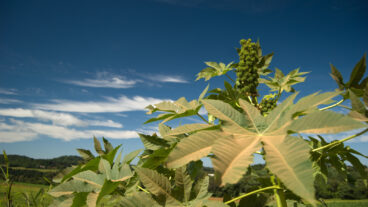Israeli alternative energy company Galten has developed a method of obtaining biofuel from the seeds of the jatropha, a plant that doesn’t compete with food crops. Trial plantings have already begun in Ghana.
It will take dedicated visionaries to help stop America’s addiction to foreign oil. And that’s what Doron Levi, the COO of alternative energy company Galten Global Alternative Energy has his heart set on doing. The telephone line was shaky and his Internet connection unreliable, yet he spoke with ISRAEL21c from far away in Ghana where he’s overseeing a project that’s squeezing fuel from the seeds of an African perennial – the jatropha plant.
The jatropha, says Levi, is rich in oil and doesn’t compete with food crops making it an ideal specimen for biofuel. Over in Ghana, he is working with about 30 locals to grow and cultivate a 250-acre site that may give rise to some of the world’s most important biofuel reserves ever.
Galten is based in Israel, but the company founders chose to plant in Ghana, where the jatropha (Jatropha curcas) already grows. “We are working according to plan growing the jatropha plants. We’ve built a nursery, but it’s not easy in Africa,” he says, noting that the indigenous bush snakes can be particularly dangerous.
A win-win situation
Despite the difficulties – and the snakes – Levi believes the company has done something special. “It’s a win-win situation – good for the world, good for the people,” he explains.
With a lease on half a million acres of land in Ghana, Galten’s founders – Levi and his partner Shlomi Jonas, now the CEO of Galten – have big plans for jatropha seeds as biofuel. Although the extraction method is secret, Levi says, experts do already know that the jatropha plant, which lives about 30 to 40 years, is a rich source of biofuel. Its seeds contain an oil content of about 35 percent, but there have been industry limitations extracting it, says Levi.
According to Galten’s website only one ton of biofuel can be extracted from 2.5 acres of edible crops such as corn or soybeans, whereas three tons of biofuel can be produced on the same amount of acreage growing jatropha plants. Levi expects Galten will be able to start producing biofuel in about two or three years: “How you do it exactly, well that’s our secret,” he says.
Not eaten by animals, jatropha plants are a vigorous, drought- and pest-tolerant plant used mainly as a hedge to protect cropland from grazing animals. It is a low-growing specimen, native to South America, but which is widely used in Central America, Africa and Asia.
High quality biofuel
Galten was founded in 2006 and is based in Kadima, Israel. According to its calculations, Galten’s extraction method not only produces a high-quality source of biofuel, it also reduces carbon dioxide emissions, which are sequestered and stored by the jatophra plant.
Eventually, the stalks and other biomass created by the plant could be used as biofuel as well. Galten is working on R&D in this direction.
Galten’s founders are ambitious and have attracted an initial round of financing of $10 million from the Xpert Financial Group based in Israel. International companies are already interested, such as Brazil’s Petroleo Brasileiro and a refinery in Europe.











